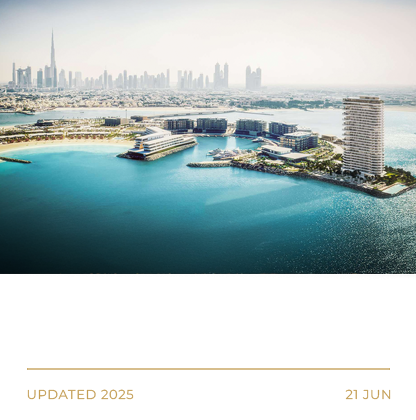
How Much to Save for a AED 1 Million Property in Dubai?
21 May 2024

Are you setting your sights on owning a slice of Dubai’s dynamic skyline? Whether it's a sleek apartment overlooking the marina or a cozy villa nestled in a tranquil suburb, buying property in Dubai is an exciting venture. With Dubai’s real estate market witnessing substantial growth and offering promising returns, understanding how much you need to save for a AED 1 million property is essential. This blog will guide you through the financial landscape of Dubai's property market, helping you to map out the savings needed to turn your dream home into a reality.
Understanding the Dubai Property Market
Dubai's property market is as diverse as it is dynamic, with offerings that cater to a wide range of preferences and budgets. Recent trends show a robust increase in transactions, particularly in luxury residential areas, spurred by the city’s growing appeal as a global business hub and its relatively tax-free living. However, navigating this market requires a solid understanding of its fluctuations and the factors that influence property prices, such as geopolitical stability, economic growth, and government regulations like visa reforms and incentives for foreign investors. For anyone looking to invest, getting acquainted with these trends is the first step towards making an informed buying decision.
The Real Cost of Buying a Property in Dubai
When planning to buy a property in Dubai, the purchase price is just the beginning. Prospective homeowners must account for a variety of additional costs that can significantly affect the total amount needed to secure a property. These include:
- Down Payment: Typically, expatriates can expect to pay a minimum of 25% of the property’s price as a down payment if the property is valued at less than AED 5 million.
- Mortgage Registration Fees: Charged at 0.25% of the loan amount, this fee is paid to the Dubai Land Department.
- Real Estate Agent’s Fee: Usually about 2% of the purchase price.
- Dubai Land Department Transfer Fee: This crucial fee amounts to 4% of the property’s value and is often split between the buyer and the seller.
- Mortgage Application Fee: Can vary, but typically about 1% of the loan amount.
- Other Costs: Including but not limited to legal fees, property valuation fees, and home insurance costs.
How Much Do You Need to Save?
To effectively plan for purchasing a property worth AED 1 million in Dubai, you'll need to consider several financial layers beyond just the purchase price. Here's a breakdown of what to expect:
- Down Payment: For a AED 1 million property, expect to save at least AED 250,000 if you are an expatriate, which is 25% of the property value.
- Additional Purchase Costs: These can include the Dubai Land Department transfer fee (typically 4% of the property value, which equates to AED 40,000), agent fees (usually around 2%, or AED 20,000), and other administrative fees like mortgage registration and application fees, which could add another AED 10,000 to 15,000.
- Total Initial Savings Requirement: Adding these up, a safe estimate would be around AED 325,000 to AED 330,000 to cover the initial costs associated with buying a AED 1 million property in Dubai.
Given these figures, potential buyers should aim to save more than the minimum down payment to comfortably cover all associated costs without financial strain. This foresight will prepare you for a smooth transition into property ownership, ensuring all financial obligations are met promptly.
Strategic Saving Tips for Potential Homebuyers
Saving for a property in Dubai requires disciplined financial planning and smart saving strategies. Here are some tips to help you accumulate the necessary funds:
- Automate Savings: Set up a dedicated savings account for your property purchase and automate monthly transfers from your main account. This helps in building the habit of saving without needing to think about it each month.
- Cut Back on Non-Essential Spending: Review your monthly expenses and identify areas where you can cut back. Luxuries, frequent dining out, and unnecessary subscriptions can add up. Redirecting these funds towards your savings can significantly accelerate your progress.
- Increase Your Income: Consider ways to boost your income, whether it’s taking on freelance work, a part-time job, or investing in assets that generate passive income. Every extra dirham earned can be directed towards your down payment.
- Invest Wisely: If you have a longer timeline before you plan to buy, consider investing your savings in low-risk investment options like bonds or mutual funds that offer better returns than a regular savings account.
- Stay Informed About Market Conditions: Sometimes, waiting for the right market conditions can also help in saving money. Prices in real estate can fluctuate due to various factors, and buying during a market dip could lower the amount needed for a down payment.
Implementing these strategies can not only help you save for your down payment more effectively but also improve your overall financial health, putting you in a better position when you decide to make your property purchase.
Financial Planning for First-Time Buyers
For first-time homebuyers, entering the Dubai real estate market can be daunting, but a well-thought-out financial plan can simplify the process. Here’s how you can create a robust financial plan:
- Assess Your Financial Health: Begin by reviewing your current financial situation, including income, debts, savings, and monthly expenses. Understanding your financial standing is crucial in determining how much you can afford to spend on a property.
- Set a Clear Budget: Once you have a grasp of your financial health, set a realistic budget for your property purchase. Consider all costs involved, not just the purchase price, and ensure your budget covers these without straining your finances.
- Create a Savings Timeline: Based on your budget, calculate how long it will take to save the necessary funds. Be realistic about how much you can save each month and set milestones to help track your progress.
- Explore Mortgage Options: Research various mortgage products available in the market. Compare interest rates, terms, and conditions offered by different banks and financial institutions to find the best fit for your financial situation.
- Consult Financial Advisors: Consider consulting with a financial advisor who can provide personalized advice based on your financial goals and needs. They can help you navigate the complexities of property investments and financial planning.
This structured approach to financial planning will ensure that first-time buyers are not only prepared financially but also positioned advantageously when they decide to enter the real estate market.
Additional Financial Considerations
Buying a property in Dubai involves several financial considerations that go beyond the initial purchase price and saving for a down payment. Here are some additional financial aspects to keep in mind:
- Maintenance and Renovation Costs: Once you own a property, ongoing maintenance and occasional renovation costs should be factored into your budget. These can vary significantly based on the property type and age.
- Community and Service Fees: Most residential communities in Dubai charge annual service fees for upkeep and use of communal facilities. These fees depend on the locality and the amenities provided.
- Insurance Costs: Home insurance is crucial to protect your property against unforeseen circumstances. Additionally, consider life insurance policies linked to your mortgage to cover loan repayment in case of unforeseen events.
- Property Management Fees: If you’re buying a property as an investment and plan on renting it out, property management fees should be considered. These fees are for services that help manage the property and deal with tenants.
- Resale and Capital Gains Considerations: Think about the future resale value of the property. While the UAE does not impose capital gains tax, understanding the potential appreciation of your property can impact your long-term financial planning.
Getting the Most Out of Your Investment
Investing in Dubai real estate can be highly rewarding, but maximizing the return on your investment requires strategic planning and market insight. Here are some tips to ensure your property investment grows in value over time:
Choose the Right Location: The value of real estate is heavily influenced by its location. Look for areas in Dubai that are in demand but also have potential for future growth. Areas near metro stations, malls, and schools generally appreciate faster.
Understand Market Trends: Keeping an eye on real estate market trends can help you buy at the right time. For instance, purchasing during a buyer's market when prices are lower can lead to higher gains as the market recovers.
Improve and Upgrade: Properties that are well-maintained or have high-quality upgrades tend to appreciate in value more significantly. Consider making cost-effective improvements that enhance the property’s appeal and functionality.
Secure Favorable Financing Options: Locking in a mortgage with favorable terms can reduce costs over time. Shop around for the best mortgage rates and consider refinancing if better options arise during the term of your loan.
Renting Versus Selling: Depending on your financial goals, decide whether renting out your property for a steady income stream or selling it for a lump sum makes more sense. Each option has different implications for revenue and involves different strategies.
By focusing on these strategic aspects, you can not only safeguard your investment but also ensure it yields optimal returns, aligning with your long-term financial objectives.
Common Mistakes to Avoid in Property Investment
Entering the Dubai real estate market can be lucrative, but common pitfalls can undermine even the most promising investments. Here are some frequent mistakes to avoid:
- Overextending Financially: One of the most critical errors is investing in a property that is beyond your financial means. It’s vital to stick to a budget and not be swayed by properties that stretch your financial limits.
- Neglecting Research: Failing to research the property, the developer, and the area thoroughly can lead to poor investment decisions. Always perform due diligence before proceeding with any purchase.
- Ignoring Additional Costs: Many buyers focus only on the purchase price and neglect to account for additional costs like maintenance, insurance, and property management fees, which can significantly affect overall profitability.
- Emotional Buying: Purchasing a property based on emotional attachment rather than sound financial reasoning can lead to regrettable decisions. Always approach property investment from a financial perspective first.
- Underestimating the Importance of Legal Counsel: In the complex landscape of real estate transactions, having reliable legal advice is crucial. Skipping this step can lead to complications during property transfers, disputes, or understanding the regulatory environment.
When is the Right Time to Buy?
Timing is crucial in real estate investment, particularly in a dynamic market like Dubai. Determining the best moment to make a purchase can significantly affect the cost of the property and its potential for appreciation. Here’s how to identify the right time to buy:
- Market Cycles: Understanding the real estate market cycles in Dubai can help you predict periods of high demand and low prices. Generally, it's best to buy during a downturn when prices are lower, and sellers may be more negotiable.
- Economic Indicators: Keep an eye on broader economic indicators such as GDP growth rates, employment rates, and government policies affecting real estate. Positive trends in these areas can signal a good time to invest.
- Personal Financial Readiness: Beyond market conditions, your financial stability is paramount. Ensure you have sufficient savings for a down payment, a stable income, and an emergency fund before committing to a large investment like property.
Making an informed decision based on both personal circumstances and market conditions will position you for a successful purchase.
Next Steps: From Saving to Buying
Once you have navigated the saving phase and are ready to purchase, it’s time to take the practical steps towards buying your property in Dubai:
- Pre-Approval for a Mortgage: Before you start shopping for a property, getting pre-approved for a mortgage can give you a clear idea of what you can afford and show sellers that you are a serious buyer.
- Engage with Real Estate Professionals: A reputable real estate agent can provide valuable insights and access to properties that meet your criteria. Additionally, a lawyer can help with the legal aspects of the transaction.
- Property Inspection and Valuation: Before finalizing any purchase, have the property professionally inspected and valued to ensure there are no hidden issues and that you are paying a fair price.
By following these steps, you transition smoothly from a prospective buyer to a property owner, making strategic decisions that enhance your financial security.
Conclusion
Investing in Dubai’s real estate market offers exciting opportunities for significant financial gains, provided you approach it with careful planning and informed strategies. From understanding how much to save for a AED 1 million property to navigating the buying process, each step requires consideration and foresight. By avoiding common pitfalls, staying informed about market trends, and strategically planning your finances, you can make your property investment journey both successful and rewarding.
N7 Real Estate is here to guide you through every step of this journey, from initial savings to handing over the keys to your new property. Reach out to us today to find out how we can help you secure your ideal home or investment property in Dubai’s thriving real estate market.
FAQs:
1. What is the minimum down payment required for buying a property in Dubai? For expatriates, the minimum down payment required when buying a property valued at less than AED 5 million is typically 25% of the property's price. This percentage can vary depending on the buyer's status and the type of property.
2. Are there any additional costs I should consider when buying a property in Dubai? Yes, beyond the purchase price, you should account for several additional costs including Dubai Land Department transfer fees (4% of the property value), real estate agent fees (usually about 2%), mortgage registration fees (0.25% of the loan amount), and other administrative costs like legal fees, mortgage application fees, and property valuation fees.
3. How can I find the best mortgage rates in Dubai? To find the best mortgage rates, it’s advisable to compare offers from multiple banks and financial institutions. Consider consulting with a mortgage broker who can offer insights and access to better rates and terms based on your financial profile.
4. What should I do to ensure I am investing in a good property? To ensure you are making a good investment, conduct thorough research on the property and the developer, check the property’s location and future development plans in the area, and have the property inspected by a professional. Additionally, reviewing historical price trends and projected growth in the area can provide valuable insights.



